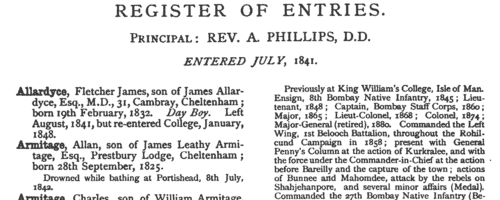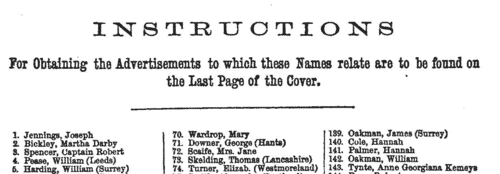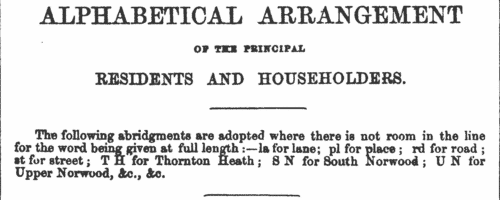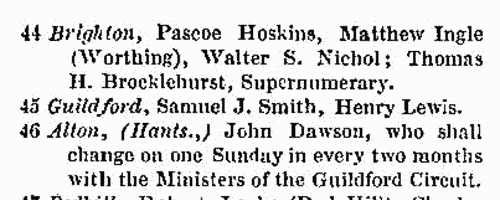Lockyer Surname Ancestry ResultsOur indexes 1000-1999 include entries for the spelling 'lockyer'. In the period you have requested, we have the following 434 records (displaying 271 to 280): Single Surname Subscription | | | Buying all 434 results of this search individually would cost £2,510.00. But you can have free access to all 434 records for a year, to view, to save and print, for £100. Save £2,410.00. More... |
These sample scans are from the original record. You will get scans of the full pages or articles where the surname you searched for has been found. Your web browser may prevent the sample windows from opening; in this case please change your browser settings to allow pop-up windows from this site. Long-stay Paupers in Workhouses: Horsham
(1861)
This comprehensive return by the Poor Law Board for England and Wales in July 1861 revealed that of the 67,800 paupers aged 16 or over, exclusive of vagrants, then in the Board's workhouses, 14,216 (6,569 men, 7,647 women) had been inmates for a continuous period of five years and upwards. The return lists all these long-stay inmates from each of the 626 workhouses that had been existence for five years and more, giving full name; the amount of time that each had been in the workhouse (years and months); the reason assigned why the pauper in each case was unable to sustain himself or herself; and whether or not the pauper had been brought up in a district or workhouse school (very few had). The commonest reasons given for this long stay in the workhouse were: old age and infirm (3,331); infirm (2,565); idiot (1,565); weak mind (1,026); imbecile (997); and illness (493). LOCKYER. Cost: £6.00.  | Sample scan, click to enlarge

| Long-stay Paupers in Workhouses: Ringwood
(1861)
This comprehensive return by the Poor Law Board for England and Wales in July 1861 revealed that of the 67,800 paupers aged 16 or over, exclusive of vagrants, then in the Board's workhouses, 14,216 (6,569 men, 7,647 women) had been inmates for a continuous period of five years and upwards. The return lists all these long-stay inmates from each of the 626 workhouses that had been existence for five years and more, giving full name; the amount of time that each had been in the workhouse (years and months); the reason assigned why the pauper in each case was unable to sustain himself or herself; and whether or not the pauper had been brought up in a district or workhouse school (very few had). The commonest reasons given for this long stay in the workhouse were: old age and infirm (3,331); infirm (2,565); idiot (1,565); weak mind (1,026); imbecile (997); and illness (493). LOCKYER. Cost: £6.00.  | Sample scan, click to enlarge

| Long-stay Paupers in Workhouses: Southampton
(1861)
This comprehensive return by the Poor Law Board for England and Wales in July 1861 revealed that of the 67,800 paupers aged 16 or over, exclusive of vagrants, then in the Board's workhouses, 14,216 (6,569 men, 7,647 women) had been inmates for a continuous period of five years and upwards. The return lists all these long-stay inmates from each of the 626 workhouses that had been existence for five years and more, giving full name; the amount of time that each had been in the workhouse (years and months); the reason assigned why the pauper in each case was unable to sustain himself or herself; and whether or not the pauper had been brought up in a district or workhouse school (very few had). The commonest reasons given for this long stay in the workhouse were: old age and infirm (3,331); infirm (2,565); idiot (1,565); weak mind (1,026); imbecile (997); and illness (493). LOCKYER. Cost: £6.00.  | Sample scan, click to enlarge

| Boys entering Cheltenham College
(1862)
Cheltenham College 'was founded in order to provide for the sons of gentlemen a Classical, Mathematical, and General Education of the highest order, on moderate terms, in strict conformity with the principles and doctrines of the Church of England.'
Andrew Alexander Hunter, the college registrar, compiled the first edition of the College Register in four parts from 1883 to 1886: these merely listed the boys by term of entry, with their dates of birth and names and addresses of their fathers. Circulars were also sent out to all Old Cheltonians whose addresses were known, requesting additional details. On the basis of the returns from these and Hunter's further researches, this much fuller register was published in 1890.
The information after each boy's name is given (where known and applicable) in this format: father's full name and address as of the time the boy entered the college; class and department on entering the college (classes being number from 1 downwards, and these again divided into A and B, some into C and D, others into P (Principal's side) and V. P. (Vice-Principal's side) - 1A was the highest class in each department: besides this, certain others were called Addiscombe, Woolwich, Civil, Direct, Line, Sandhurst, Naval, Special, Preparatory, Latin, and India Civil) and the same on leaving, name of Boarding House (or 'Day Boy'), scholastic and athletic honours attained at the college, and subsequent career (including date and place of death, or present address in 1890, if known).LOCKYER. Cost: £4.00.  | Sample scan, click to enlarge

| Unclaimed Money and Property
(1864)
Gun & Co. of 17 Charlotte Street, London, published this 'List of Next of Kin & Heirs, &c., who have been Advertised for in the English, Irish, Scotch, United States of America, Canadian, Australian, East and West Indian, and other Newspapers, since 1704. Money & Property to the value of many Millions Sterling want Claimants'. The list of 4076 names gives surname, christian name, and, occasionally, locality. Copies of the actual advertisements were furnished to enquirers by the company at a cost of six shillings. LOCKYER. Cost: £6.00.  | Sample scan, click to enlarge

| Country Members of the Pharmaceutical Society
(1865)
The annual list of Members, Associates and Apprentices of the Pharmaceutical Society of Great Britain includes lists of London Members and Country Members (giving year of membership, number of certificate (if any), full name (surname first), and address: an asterisk indicates a Life Member); Associates admitted before 1 July 1842 (with full name, and where registered); Associates of the Society who had passed the Major Examination and were registered as Pharmaceutical Chemists, and Associates of the Society who had passed the Minor Examination and were registered as Assistants (year of admission, number of certificate, full name, and where registered); and Registered Apprentices (with date of registration, full name, residing with, and town).
LOCKYER. Cost: £4.00.  | Sample scan, click to enlarge

| East Kent Registered Electors: Bobbing
(1865)
The poll for two knights of the shire to represent the Eastern Division of the county of Kent in parliament was taken 18 July 1865, the candidates being Sir Edward Cholmeley Dering, bart., (D), Sir Brook William Bridges, bart., (B), and Sir Norton Joseph Knatchbull, bart., (K). This poll book lists all registered electors, whether they voted or not, by electoral district (Ashford, Canterbury, Dover, Faversham, Hythe, Margate, Ramsgate, Romney, Sandwich, Sheerness, Sittingbourne, Whitstable and Wingham) and then by township or parish within which lay the property whereby the electors had qualified. The lefthand column gives sequential number in the whole volume; then follows the elector's full name, surname first, and his address (often elsewhere); and on the righthand side for whom he voted. When the elector was qualified in duplicate the vote is recorded opposite to the number upon which he claimed to vote at the polling booth, and wherever his name occurs elsewhere a reference is made, immediately after the address, to the number where his vote is recorded, with the initials of the candidates for whom he voted. Duplicate voters who were dead at the time of the election, or did not vote, are printed in italics to signify that they did not vote, or are stated to be dead once only; and wherever the names of such electors occur elsewhere references are made to the numbers where alone they are reckoned in the abstract of the poll as dead or not voting. Whenever a number only, without any other reference, follows the address, it denotes that at the number referred to, the elector is entered as not voting. LOCKYER. Cost: £6.00.  | Sample scan, click to enlarge

| Residents and Householders of Croydon
(1865)
The sixth edition of 'The Commercial and General Directory of the Town and Parish of Croydon; including South Norwood, Upper Norwood, Woodside, Stroud Green, and Shirley' published by F. Warren in 1865, includes this 'Alphabetical Arrangement of the Principal Residents and Householders'. The abbreviation S N stands for South Norwood; T H for Thornton Heath; and U N for Upper Norwood.LOCKYER. Cost: £4.00.  | Sample scan, click to enlarge

| Wesleyan Ministers
(1867)
The Wesleyan Methodist church in England and Ireland held annual conferences, abbreviated minutes of which were printed in the Wesleyan Methodist Magazine of September and October each year. These minutes include a complete list of the stations of the ministers for the coming year, with the names of the preachers 'on trial' and supernumeraries, arranged by district. The 32 British districts are covered, but not the ministers in Ireland or abroad.LOCKYER. Cost: £6.00.  | Sample scan, click to enlarge

| Patentees of New Inventions
(1869)
Index of patentees and applicants for patents of inventions in 1869: giving full name of patentee (surname first); number of patent (in bold); date (within 1869); and subject-matter. Where the patentee was acting as agent for third parties, their names are given in italics in the subject-matter column.LOCKYER. Cost: £4.00.  | Sample scan, click to enlarge

|
Research your ancestry, family history, genealogy and one-name study by direct access to original records and archives indexed by surname.
|












